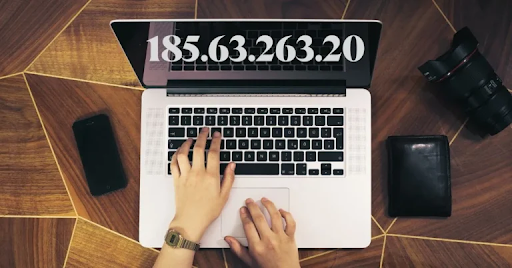Unmasking 185.63.263.20: What This Mysterious IP Address Really Means for You

Hi dude, when digging through your web logs or security firewall alerts, you might have come across 185.63.263.20 — and yes, it’s more than just numbers. This IP address has drawn attention for good reason. Whether you’re a site admin, a cybersecurity analyst, or just a curious user, understanding the background and activity related to 185.63.263.20 is essential.
What Is 185.63.263.20 and Why Is It Showing Up in Your Logs?
The IP address 185.63.263.20 is part of a block registered under a European hosting provider, often associated with anonymous traffic or automated bots. It’s not a random blip. In fact, many websites report repeated requests from this address, raising questions about its intentions — is it harmless, or does it pose a threat?
In most cases, if you’re spotting it in your server logs, it means your website has received a request from this IP address. The nature of that request, however, can vary widely. Sometimes it might be a bot scraping your content, other times it may be part of a broader network scan probing for vulnerabilities.
Technical Breakdown of 185.63.263.20
- IP Version: IPv4
- Type: Static
- Location: Generally geolocated to Europe (often linked to data centers in the Netherlands or Eastern Europe)
- ISP: Frequently masked behind hosting companies offering VPS services
- Domain Association: Often found without a reverse DNS, indicating anonymized usage
- First Seen: It has been appearing in cybersecurity reports since early 2023
Potential Reasons for Access from 185.63.263.20
Understanding the motive behind visits from this IP can help you determine your next steps:
1. Web Scraping Bots
A frequent use case — 185.63.263.20 may be part of a scraping network. These bots access multiple web pages rapidly to extract content or data, often without the owner’s permission. While not all scraping is malicious, it can burden your server and violate your site’s terms of use.
2. Vulnerability Scanners
Some cybersecurity tools use IP addresses like 185.63.263.20 to scan websites for weak points. While ethical scanners typically reveal themselves and provide reports, shady versions hide behind anonymized networks.
3. Spam or Brute-Force Attempts
In some cases, this IP has been linked to login brute-force attacks, where bots try multiple username and password combinations. If you run a CMS like WordPress, this type of attack can target your admin login page.
4. SEO or Analytics Tools
It’s also possible the IP is connected to a third-party tool you or someone else used for SEO audits, performance analysis, or link checking.
Is 185.63.263.20 Malicious? Let’s Look at Threat Intelligence
Various threat intelligence platforms have flagged 185.63.263.20 under suspicious activity patterns. Though not blacklisted universally, it’s been seen:
- Initiating repeated HTTP requests in short intervals
- Accessing non-public URLs or attempting to brute force login endpoints
- Generating 404 errors by scanning for outdated or exposed scripts
- Bypassing robots.txt directives
Given this behavior, it’s wise to be cautious. While it may not be outright malware, its behavior mimics reconnaissance tactics used by hackers.
What to Do if You See 185.63.263.20 in Your Server Logs
When this IP starts appearing consistently, here’s a professional action plan:
1. Analyze the Access Logs
Use tools like AWStats, GoAccess, or Webalizer to inspect which pages 185.63.263.20 accessed, the frequency, and the time intervals.
2. Geo-Blocking or IP Blocking
If it’s coming from a known data center and serves no legitimate purpose, blocking 185.63.263.20 using .htaccess, firewall rules, or server-level tools like CSF is a smart move.
Example .htaccess rule:
apache
CopyEdit
<Limit GET POST>
order allow,deny
deny from 185.63.263.20
allow from all
</Limit>
3. Rate Limiting & CAPTCHA
Implement rate limiting through plugins like Fail2Ban, or activate CAPTCHA on login forms and comment sections to stop brute force attacks.
4. Monitor Continuously
Use monitoring services like Cloudflare, Sucuri, or Wordfence to track and alert suspicious behavior in real-time. You can even configure them to auto-ban any IP exhibiting bot-like behavior.
How to Identify if 185.63.263.20 Is Part of a Larger Botnet
When you notice consistent activity from 185.63.263.20, it may not be acting alone. Often, these IPs are part of distributed networks. Check for:
- Similar user-agent strings
- Repeating patterns across multiple IPs
- Unusual referrers or blank headers
Correlate this with known threat lists (e.g., AbuseIPDB or VirusTotal) to determine if the IP belongs to a larger campaign.
Should You Report Activity from 185.63.263.20?
Yes, especially if it appears hostile. Here’s how:
- Submit a report to AbuseIPDB: This contributes to the community database.
- Notify your hosting provider: They can apply server-level mitigation.
- Contact the ISP hosting the IP: If identified, you can send logs and request action.
Reporting ensures others are also protected and puts pressure on shady actors.
How to Protect Your Site from Similar Suspicious IPs
Once you deal with 185.63.263.20, consider broader defense tactics:
1. Use a WAF (Web Application Firewall)
Solutions like Cloudflare, Akamai, or Imperva block malicious traffic before it hits your server.
2. Implement Intrusion Detection Systems (IDS)
Services like OSSEC, Snort, or Tripwire help track changes and alert on unusual patterns.
3. Audit Third-Party Plugins and Services
Old or insecure plugins may unintentionally expose your site to bots from IPs like 185.63.263.20.
4. Update CMS and Software Regularly
Whether you use WordPress, Joomla, or Drupal — staying up to date minimizes vulnerabilities bots look for.
Final Thoughts: Stay Informed, Stay Secure
The IP address 185.63.263.20 isn’t inherently evil, but its behavior raises red flags. Whether it’s scraping your site, attempting brute-force attacks, or running reconnaissance, the best defense is layered protection, regular log reviews, and proactive security measures.
Keep monitoring your server logs, stay informed about the latest IP-based threats, and don’t hesitate to block traffic that serves no valid purpose.
If you’ve seen activity from 185.63.263.20, it’s not a coincidence — and you’re not alone. Many web admins across the globe have had similar encounters.
FAQs about 185.63.263.20
Q1: What is 185.63.263.20?
A: It’s an IPv4 address often linked to automated bots or suspicious web activity, typically originating from European data centers.
Q2: Why is 185.63.263.20 in my server logs?
A: It likely accessed your website, possibly for scraping, scanning, or testing for vulnerabilities.
Q3: Is 185.63.263.20 dangerous?
A: While not always malicious, its behavior can mimic that of harmful bots or scanners. It’s best to investigate further.
Q4: Should I block 185.63.263.20?
A: If it’s causing suspicious or unwanted traffic, blocking it via your firewall or .htaccess is a smart move.
Q5: How do I block this IP address?
A: You can block it using server settings, firewall rules, or security plugins like Wordfence or Fail2Ban.
Q6: Is 185.63.263.20 part of a botnet?
A: It may be part of a larger network of IPs engaging in coordinated scanning or crawling behavior.
Q7: How do I report 185.63.263.20?
A: You can report it to AbuseIPDB or your hosting provider for further action.
Stay in touch for more updates and alerts visit: Usa VyVyManga





